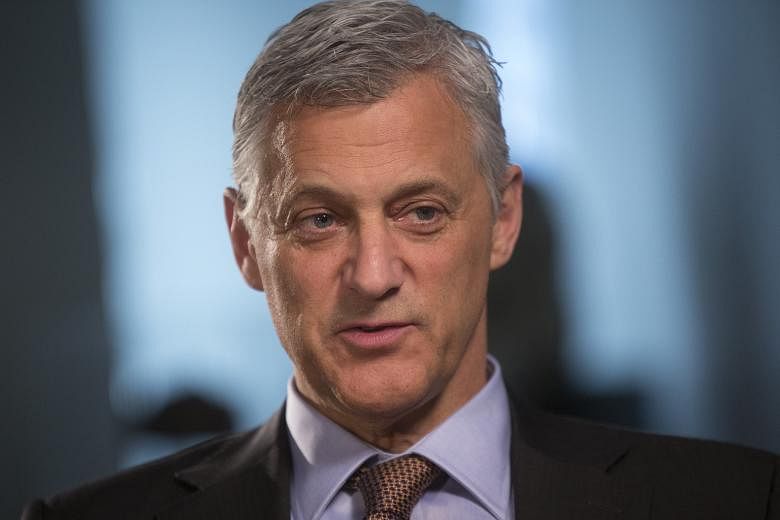LONDON • Bill Winters found more than just bad loans when he took over Standard Chartered. He says he uncovered a culture where a few senior managers flouted ethics rules for personal gain and considered themselves "above the law".
The lender is cracking down after "recent transgressions" concerning some employees' outside business interests, close financial dealings with co-workers and excessive expenses, according to memos issued over the past two months that were seen by Bloomberg News.
In an effort spearheaded by general counsel David Fein, the British bank, which does almost all of its business in Asia and emerging markets, is also beefing up its internal investigation team with former detectives from the FBI, Scotland Yard, Hong Kong police and the New Zealand intelligence agency.
"I am concerned that a small number of employees, including some senior managers, have wilfully disregarded our policies - sometimes for personal gain - and set a poor example for their peers and teams," Mr Winters, the bank's chief executive officer, said in the first memo, sent in April, titled #knowtherules. "I am deeply disappointed and angry at some of the examples we are finding."
Mr Winters inherited a bank in crisis. Emerging-market and commodity loans were souring while the bank was hit with fines of almost US$1 billion (S$1.35 billion) since 2012 for alleged money-laundering compliance failures and sanctions violations involving Iran.
Since arriving a year ago, Mr Winters has replaced much of the senior executive team. In April, he said he had encountered "a looseness" to the way the bank was managed during years of rapid growth.
The bank is still under the scrutiny of an independent monitor as part of a 2012 deferred prosecution deal, when it was fined US$667 million for violating US sanctions by engaging in US$250 billion in transactions with Iran. If the lender slips up significantly again, it could lose its US banking licence.
In the memo, Mr Winters, an American, described a culture where some managers felt they were "above the law" and had sometimes ignored requirements to complete compliance training.
"I want this to be clearly understood - we have zero tolerance for any employee that deliberately flouts and circumvents our rules and policies, without regard for their seniority, or role."
A probe into misconduct has led to the departure of several bankers in Dubai in the past six months, including at least three managing directors, people with knowledge of the matter said. They were found to have improperly lent money to colleagues, while also padding their expense reports, the people said.
Stanchart is providing real examples of rule-breaking and conflicts of interest in the memos, particularly those of managers expected to set an example, said Ms Pam Walkden, its new human resources chief.
One memo cites three senior employees who did not disclose their investment in an unlicensed money lender that charged high rates of interest. They were all dismissed.
The bank is investigating whether former senior managers should have their pay clawed back if they were guilty of misconduct or if there were failures of supervision, Mr Fein said.
Shareholders are impatient for the bad headlines to end. The bank reported its first annual loss since 1989 last year and scrapped the dividend. Mr Winters has had to tap investors for US$5.1 billion, while planning 15,000 job cuts. The stock is trading at about half its book value after plummeting 66 per cent since the start of 2013. It has fallen 10 per cent this year.
Stanchart is not alone in tightening conduct rules as banks worldwide dig deep to cut costs and seek to avoid falling foul of bribery laws.
Since 2014, Barclays has banned employees from giving or receiving gifts or entertainment of any value and requires all broker meetings to be in-house. Goldman Sachs Group is increasingly rejecting spending on airfare, hotels and entertainment unless it directly serves clients as the firm cuts costs, sources said in April.
BLOOMBERG

